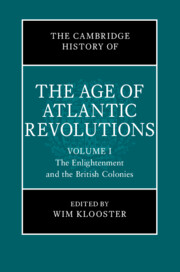Book contents
- The Cambridge History of the Age of Atlantic Revolutions
- The Cambridge History of the Age of Atlantic Revolutions
- The Cambridge History of the Age of Atlantic Revolutions
- Copyright page
- Contents
- Figures
- Maps
- Contributors to Volume i
- Preface
- Introduction
- Part I Enlightenment and Culture
- 1 Enlightenment and the American Revolution
- 2 Enlightenment and the French Revolution
- 3 Enlightenment and the Ibero-American Revolutions
- 4 Cultural Practices and Revolutions, c. 1760–1825
- Part II The British Colonies
- Index
4 - Cultural Practices and Revolutions, c. 1760–1825
from Part I - Enlightenment and Culture
Published online by Cambridge University Press: 20 October 2023
- The Cambridge History of the Age of Atlantic Revolutions
- The Cambridge History of the Age of Atlantic Revolutions
- The Cambridge History of the Age of Atlantic Revolutions
- Copyright page
- Contents
- Figures
- Maps
- Contributors to Volume i
- Preface
- Introduction
- Part I Enlightenment and Culture
- 1 Enlightenment and the American Revolution
- 2 Enlightenment and the French Revolution
- 3 Enlightenment and the Ibero-American Revolutions
- 4 Cultural Practices and Revolutions, c. 1760–1825
- Part II The British Colonies
- Index
Summary
This chapter offers a critical analysis of how scholars have interpreted the relationship between eighteenth-century cultural practice and revolutionary politics, circa 1760 to 1825. The chapter first surveys and classifies eighteenth century cultural practice, identifying three main types: the social arts, practices of everyday life, and fine arts. The bulk of the essay then reflects on three major paradigms for interpreting how these forms of culture interacted with revolutionary politics. The dominant approach, exemplified by literature on the “bourgeois public sphere,” argues that eighteenth-century culture prefigured or lay the groundwork for revolutionary politics. Other scholars, particularly those working on the fine arts in the revolutionary era, have emphasized how cultural practices were transformed by revolutionary politics. A third, newer approach emphasizes the autonomy of cultural practice. Scholars working within this paradigm argue that cultural change was itself a form of revolution and that culture acted as an independent container for new political practices during the revolutionary era. This paradigm points the way to a broader, more inclusive account of revolution in this period. The essay covers the historiographies of eighteenth-century culture and revolutionary politics in North America, Europe (especially France and the Netherlands), and Latin America (especially Peru).
- Type
- Chapter
- Information
- The Cambridge History of the Age of Atlantic Revolutions , pp. 132 - 158Publisher: Cambridge University PressPrint publication year: 2023

